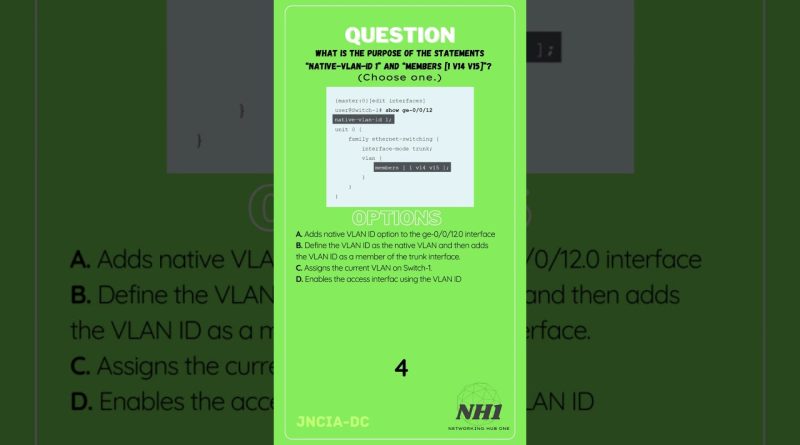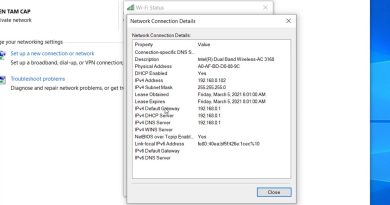Q187 | JNCIA-DC | Module-4 – Virtual Networks
#juniper #jncia #datacenter #shorts
*What is JNCIA-DC?*
The Data Center track enables you to demonstrate competence with data center technologies and related configuration and troubleshooting skills. JNCIA-DC, the associate-level certification in this track, is designed for data center networking professionals with introductory-level knowledge of the Juniper Networks Junos software and data center devices.
The written exam verifies your understanding of data center technologies, related platform configuration, and troubleshooting skills.
*Prerequisite Certification:* None
*Exam Length:* 90 minutes
*Exam Type:* 65 multiple-choice questions
*Exam Code:* JN0-280
*Recommended Training:* IJDCN – Introduction to Juniper Data Center Networking
*Exam Objectives:*
1. Data Center Architectures
2. Layer 2 Switching, VLANs and Security
3. Protocol-Independent Routing
4. Data Center Routing Protocols BGP/OSPF
5. High Availability (HA)
*Data Center Architectures*
Identify concepts and general features of Data Center architectures
– Traditional Architectures (multi-tier)
– IP-Fabric Architectures (Spine/Leaf)
– Layer 2 and Layer 3 strategies
– Overlay Network versus Underlay Network (Very Basic)
– EVPN/VXLAN basics/purpose
*Layer 2 Switching, VLANs and Security*
Identify the concepts, operation, or functionality of Layer 2 switching for the Junos OS
– Ethernet switching/bridging concepts and operations
Identify the concepts, benefits, or functionality of VLANs
– Port modes
– VLAN Tagging
– IRB
Identify the concepts, benefits, or functionality of Layer 2 Security
– MACsec
– MAC address control/filtering
– Storm Control
Describe how to configure, monitor, or troubleshoot Layer 2 switching, VLANs, or security
– Ethernet switching/bridging
– VLANs
– Layer 2 security features
*Protocol-Independent Routing*
Identify the concepts, operation, or functionality of various protocol-independent routing components
– Static, aggregate, and generated routes
– Martian addresses
– Routing instances, including RIB groups
– Load balancing
– Filter-based forwarding
Describe how to configure, monitor, or troubleshoot various protocol-independent routing components
– Static, aggregate, and generated routes
– Load balancing
*Data Center Routing Protocols BGP/OSPF*
Identify the concepts, operation, or functionality of OSPF
– Link-state database
– OSPF packet types
– Router ID
– Adjacencies and neighbors
– Designated router (DR) and backup designated router (BDR)
– OSPF area and router types
– LSA packet types
Describe how to configure, monitor, or troubleshoot OSPF
– Areas, interfaces, and neighbors
– Additional basic options
– Routing policy application
– Troubleshooting tools
Identify the concepts, operation, or functionality of BGP
– BGP basic operation
– BGP message types
– Attributes
– Route/path selection process
– IBGP and EBGP functionality and interaction
Describe how to configure, monitor, or troubleshoot BGP
– Groups and peers
– Additional basic options
– Routing policy application
*High Availability (HA)*
Identify the concepts, benefits, applications, or requirements of high availability
– Link aggregation groups (LAG)
– Graceful restart (GR)
– Bidirectional Forwarding Detection (BFD)
– Virtual Chassis
Describe how to configure, monitor, or troubleshoot high availability components
– Link aggregation groups (LAG)
– Graceful restart (GR)
– Bidirectional Forwarding Detection (BFD)
*IJDCN – Introduction to Juniper Data Center Networking*
This course lays the foundational knowledge necessary to understand a data center that is built upon an IP fabric, but does not include Ethernet VPN–Virtual Extensible LAN (EVPN-VXLAN) architecture.
This course covers Ethernet switching, VLANs, Layer 2 security features, routing policies, link aggregation, load balancing, filter-based forwarding (FBF), routing instances, BGP, graceful restart, and bidirectional forwarding detection (BFD).
*Q&A*
*Questions an Answers (MCQs) – IPv4 Addressing* https://www.youtube.com/playlist?list=PLrUeok5vppohcw6ydMnhJcMP8iDDy5Hwn
*Questions an Answers (MCQs) – DHCP* https://www.youtube.com/playlist?list=PLrUeok5vppoiDb2kVj3vjL1wEUgEkY4mF
*Questions an Answers (MCQs) – Cisco IOS* https://www.youtube.com/playlist?list=PLrUeok5vppog9waw8kqOFiqAEZDK4zpwV
*Questions an Answers (MCQs) – RIP* https://www.youtube.com/playlist?list=PLrUeok5vppohivaMBzAMLffKbtsbujcjM
*Questions an Answers (MCQs) – JNCIA-DC* https://www.youtube.com/playlist?list=PLrUeok5vppojOrQ5mt95dqTTAW5EAaX2q
*Informative Short Videos* https://www.youtube.com/playlist?list=PLrUeok5vppoinzXtCfecjhH1MSZCEMR0U
#networkinghubone
ipv4



